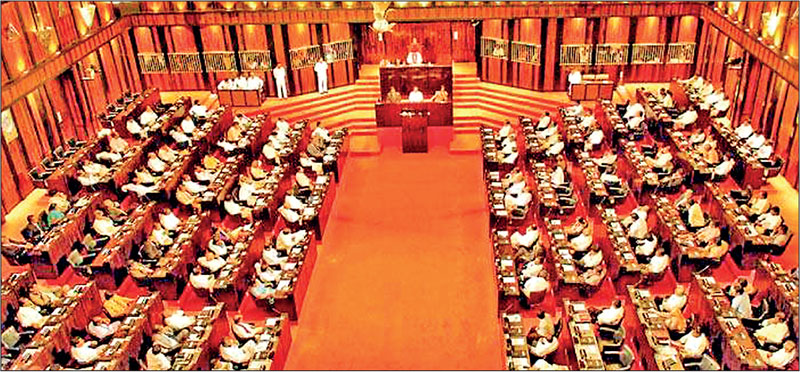Wednesday Feb 18, 2026
Wednesday Feb 18, 2026
Tuesday, 1 July 2025 00:37 - - {{hitsCtrl.values.hits}}

Parliamentary oversight of these issues appears limited, with calls growing for more robust scrutiny of energy sector appointments and decision-making processes
 Serious questions about governance practices within Sri Lanka’s energy sector are emerging, as concerns grow over potential conflicts of interest, policy inconsistencies, and transparency gaps that could undermine the nation’s energy security and economic future.
Serious questions about governance practices within Sri Lanka’s energy sector are emerging, as concerns grow over potential conflicts of interest, policy inconsistencies, and transparency gaps that could undermine the nation’s energy security and economic future.
The concerns centre on a troubling pattern of individuals moving between private consulting roles and public regulatory positions without adequate safeguards. This raises fundamental questions about whether energy policy is serving national interests or private agendas.
At the heart of these concerns lies the issue of the “revolving door” between private energy consultancies and public sector appointments. Sources familiar with the sector point to instances where individuals have transitioned from leading private firms involved in policy development to assuming key regulatory roles, while their family members or associates reportedly continue to benefit from ongoing business relationships with Government entities.
The situation has drawn attention from consumer advocacy groups and governance watchdogs, who argue that existing conflict-of-interest protocols appear inadequate for addressing the complex web of relationships that characterise the energy sector. The Electricity Consumers Association has reportedly filed formal complaints with anti-corruption authorities, highlighting specific instances where they believe proper procedures were not followed.
Beyond environmental considerations
These governance concerns are significant given apparent shifts in Sri Lanka’s energy policy direction. Critics point to what they describe as an unexplained retreat from renewable energy commitments, with decisions that favour fossil fuel imports over domestic renewable capacity development. The implications extend beyond environmental considerations to encompass energy security and foreign exchange expenditure, as increased reliance on imported fuels could leave the country more vulnerable to global price volatility.
Policy documents that form the backbone of Sri Lanka’s energy planning have themselves become subjects of scrutiny. Questions have been raised about the process by which private consulting firms are selected to draft national energy roadmaps, and whether adequate oversight exists to ensure these documents reflect genuine national priorities rather than the commercial interests of their authors.
The pattern of concern extends to the speed and nature of policy changes following key personnel appointments. Observers note that significant shifts in energy sector priorities have occurred without adequate public consultation or clear justification, leading to speculation about the proper drivers of these decisions. Social media has become a battleground for these disputes, with sector insiders making public allegations about financial arrangements and policy motivations. When questioned by established media outlets about these claims, some officials have responded defensively, further fuelling public suspicion about transparency in the sector.
Sri Lanka’s energy future
The stakes for Sri Lanka’s energy future could not be higher. Energy security directly impacts national economic stability, while policy decisions made today will determine whether the country can achieve energy independence or remain dependent on costly imports. Environmental commitments and climate change obligations add another layer of complexity to these decisions.
Consumer groups warn that governance failures in the energy sector ultimately translate into higher electricity tariffs for ordinary citizens, undermining investor confidence in renewable energy projects that could provide long-term economic benefits. The foreign exchange implications of energy policy choices are particularly acute for a country still recovering from recent economic challenges.
Parliamentary oversight of these issues appears limited, with calls growing for more robust scrutiny of energy sector appointments and decision-making processes. Civil society organisations demand stronger conflict-of-interest regulations, mandatory cooling-off periods for transitions between private and public roles, and greater transparency in how policy consulting contracts are awarded and monitored.
The concerns extend beyond individual cases to encompass what critics describe as potential “regulatory capture” – a situation where the entities that regulate an industry become dominated by the interests they are supposed to oversee. Warning signs include rapid policy changes following personnel appointments, limited public consultation on significant decisions, and patterns of decisions that consistently benefit specific interest groups.
Independent experts suggest that the current governance framework may be inadequate for managing the complex relationships and potential conflicts characterising modern energy markets. They point to the need for comprehensive reforms that could include enhanced disclosure requirements, independent oversight mechanisms, and regular audits of decision-making processes.
The international development community, which provides significant funding for Sri Lanka’s energy sector development, may also watch these developments closely. Donor confidence in governance systems could influence future financing for critical energy infrastructure projects.
Immediate action to address governance gaps
As these concerns mount, calls are growing for immediate action to address governance gaps before they further undermine public trust. Proposed measures include comprehensive reviews of existing frameworks, public consultations on transparency measures, and independent audits of recent major decisions that have shaped the country’s energy trajectory.
The resolution of these governance questions will likely determine the immediate direction of Sri Lanka’s energy policy and the country’s long-term energy security and economic development prospects. With energy infrastructure decisions having decades-long implications, ensuring that these choices reflect genuine national interests rather than private agendas has become a matter of urgent national importance.
The energy sector’s role in national development means that governance failures in this area could have cascading effects across the economy. Transparency and accountability are not just good governance principles but essential elements of national security and economic stability.